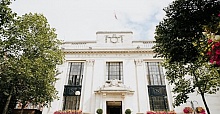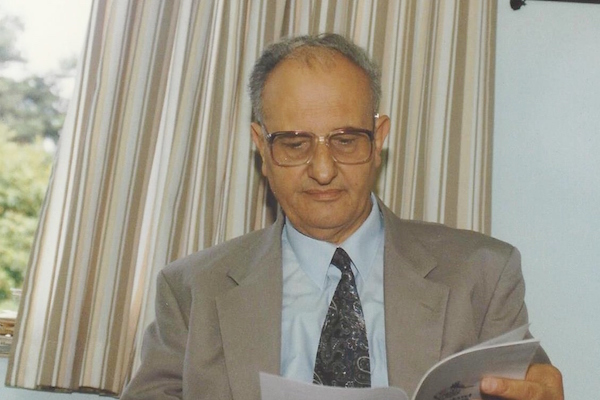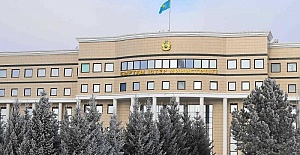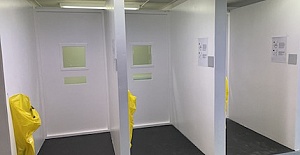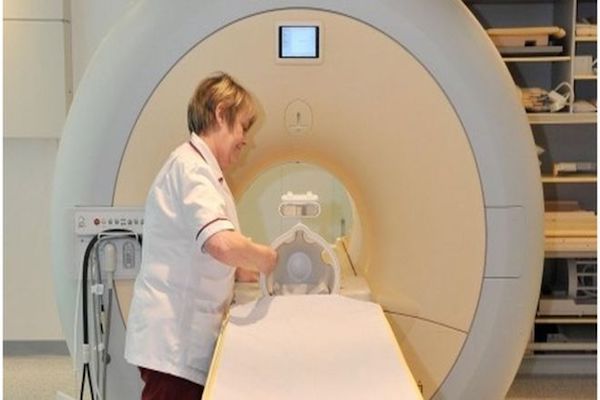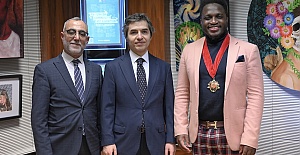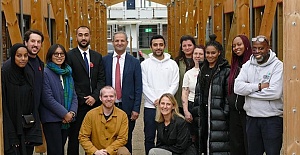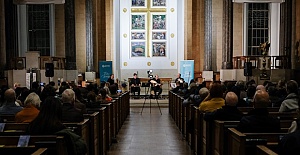Prof. Sonyel was born in Cyprus in 1932 and graduated from the English School based in Nicosia and later went to serve as a Civil Servant in the British Colonial Administration.
“I took early retirement to concentrate on my research and writings” said Prof. Dr. Salahi Sonyel, who sadly passed away on Christmas Day 2015, in an interview I had conducted with him back in 1998. And indeed his writings and all the research he conducted over many years made him one of the most respected Turkish Cypriot historians residing in Britain.
He first came to Britain in 1957, studied at the Queen's University, Belfast and obtained his BA and MA qualifications in 1959. Prof. Sonyel returned to Cyprus and then back to the UK in 1964 after the troubles that were occurring in Cyprus. Since then he lived in the UK for over 50 years till his death. In 1971, he gained his PhD from the University of London and became an Associate of the Institute of Education and a member of the Turkish Cyprus Association for over 40 years, the first Turkish Association established in Europe.
As a historian he was an expert on Atatürk, Atatürk’s revolutions, Turkey’s Independence war and the period during the establishment of the Republic of Turkey. His passion on the subjects of Armenians in Turkey and on the question around Armenian massacre in the 1915, were a central theme in his books and pamphlets. He was an honorary member of the Turkish Historical Society based in Ankara.
After our first meeting in1998, I met Prof. Sonyel on many occasions and interviewed him on various different other subjects. Some of the areas, such as migration, identity, racism and being Turkish and living in the UK, Prof. Sonyel as a historian, he was just as committed as a social scientist.
Soon after I met him, I learned about his research in the area of Turkish migration while he was active in the Cyprus Turkish Association during the 1970’s and 1980’s. I discovered fairly quickly that he was interested in the education of Turkish and Muslim children in schools and had written many articles about their situation and education improvement strategies. His book “The Silent Minority – Turkish Muslim Children in British Schools” published in 1988 widened the debate within society on the underachievement of the Turkish speaking children in British schools which remains a challenge even today.
To my surprise, I went on to discover the immense work he had carried out in the area of the Turkish people living in Britain. During my research in the archives of Cyprus Turkish Association I came across many articles written by him on the exclusion of the “silent community” in which he refers to as the ‘Turkish Muslim Community’ and many more articles about Turkey’s history in the magazines which were published by the CTA, in particular in Turkish “Toplumun Sesi” and the others in the English language like “Turkish News”. The more I delved into the extensive archives the more I discovered the many old articles written or edited by Prof Sonyel.
In one of our conversations Prof. Sonyel told me he had originally wanted to become a poet and wanted to work in the area of literature, something he was very passionate about. However the Turkish-Cypriot poet and writer Nazif Süleyman Ebeoğlu said to him at the beginning of the 1950’s that Osman Türkay will become a very famous poet, but he (Prof.Sonyel) should rather concentrate his energy on other areas like political science, economics or social sciences. Nazif Süleyman Ebeoğlu’s advice was to prove very wise and helped Prof Sonyel to find his own way into the world of social sciences. He was very grateful to Nazif Süleyman Ebeoğlu, whom he considered his teacher and mentor.
Prof. Sonyel also worked very closely with the twice Nobel Price Nominee Turkish Cypriot poet Osman Turkay and helped him with the publication of magazines along with other members of CTA. Innovative papers and articles were published on the issues faced by ethnic minorities which were unique and ground breaking during the period, especially in the 1970’s where people were more interested in talking about the migrants’ issues rather than analysing and writing about them. I have not yet come across in any periodicals which were published during the 1970’s by any other ethnic minority communities concerning the issues faced by migrants during that era.
Prof Sonyel was aware of the existence of racism in British society and worked tirelessly to overcome the prejudice in the wider community. He told me in one of our conversations: “When I first came here, I tried to find employment but found it very difficult because of my name, as it is a Muslim name. I changed my name within a fortnight and I became the head of a large social science department in a secondary school. I changed my name when racism was rampant in the UK; it was before the time of the emergence of multi-cultural education. But for the Turkish people who have changed their names like me are doing well but a lot of the Turks who hung on to their names, experienced racism.”
The modern day term ‘Islamophobia’ seems to have existed in different guises much before the 9/11 events. In fact it is shocking to know that a respected historian and academic had to change his Muslim sounding name in to an English sounding one, in order to progress within his profession and professional life. It is important to mark the current atrocities happening in the name of Islam increased Islamophobia in the British society, yet we must also remember that Islamophobia is not an entirely new issue.
Prof. Sonyel reminded me in some of our interviews on this subject that, the level of racism is not the same as that experienced by Asian or Black people living in Britain. However, he always added that all the Ethnic Minorities are experiencing varying degrees of racism in diverse areas of their working or professional lives.
Prof. Sonyel will be remembered not only as a historian but I believe it would be improper if we failed to recognise him as a social scientist, too. It would be unforgiveable to forget all the work he has done in the last 50 years, in the area of exclusion, xenophobia, education of Turkish speaking children and Turkish migration to Britain.
Prof. Sonyel was one of many remarkable people from the Turkish Speaking Community who came to Britain, stayed in Britain, worked and lived in Britain. And during his time as many others, Prof. Sonyel left an indelible mark and a treasure trove of writings for his own Turkish community, to the Ethnic Minority communities, to the academic community and to the wider British society. He worked very hard and crafted his thoughts into words, the words converted into books; books will be converted in the future into new thoughts. Prof. Sonyel left a written historical legacy for the future generation of the Turkish Speaking Communities not only in Britain but across the world. The void he leaves behind will not be easily filled and will take time.
He once remarked, “I live in Britain with my Turkish Cypriot identity. I carry my Turkish identity everywhere I go but of course, I am part of the wider British society, too.”
Prof. Sonyel has published many books, articles and pamphlets. Some of his books in English are ‘Atatürk – The Founder of Modern Turkey’, ‘Minorities and The Destruction of The Ottoman Empire’ and ‘The Assyrians of Turkey Victims of Major Power Policy’. His works appeared in numerous periodicals and newspapers in Cyprus, Turkey, Greece, UK, in the United States and in other countries. He was a visiting professor at the Near East University in Lefkoşa (Nicosia), in the Turkish Republic of Northern Cyprus, in some Universities in Turkey, Britain and other countries.
Prof. Sonyel became a major part of the history of the Turkish people living in Britain and also played a huge role in recording history and sharing his analysis of the Turkish people living in the UK.
He was married and had two daughters.


 Prime Minister Keir Starmer's 2025 Easter message
Prime Minister Keir Starmer's 2025 Easter message After Nesil Caliskan a by-election will be held in Jubilee ward in Enfield
After Nesil Caliskan a by-election will be held in Jubilee ward in Enfield Publishing the analysis, Labour’s Cllr Ergin Erbil said Everybody in Enfield deserves basic rights
Publishing the analysis, Labour’s Cllr Ergin Erbil said Everybody in Enfield deserves basic rights Gaza-Israel conflict Statement from Cllr Ergin Erbil, Leader of Enfield Council
Gaza-Israel conflict Statement from Cllr Ergin Erbil, Leader of Enfield Council The European Union called on Turkey to uphold democratic values
The European Union called on Turkey to uphold democratic values Turkish citizens in London said Rights, Law, Justice
Turkish citizens in London said Rights, Law, Justice The Council of Turkish Cypriot Associations Geneva response letter
The Council of Turkish Cypriot Associations Geneva response letter Sustainable Development and ESG, Will This Become the Course for Turkic World
Sustainable Development and ESG, Will This Become the Course for Turkic World The 'Prince of Paris' has impressed in his first EuroLeague season
The 'Prince of Paris' has impressed in his first EuroLeague season Saran Media And Euroleague Basketball Extend Media Rights Partnership for Four More Years
Saran Media And Euroleague Basketball Extend Media Rights Partnership for Four More Years Will Rangers be Jose Mourinho’s next victim?
Will Rangers be Jose Mourinho’s next victim? Jose Mourinho's Fenerbahce face Rangers on Thursday
Jose Mourinho's Fenerbahce face Rangers on Thursday Barclays has become the biggest UK lender so far to cut mortgage rates
Barclays has become the biggest UK lender so far to cut mortgage rates THE SPRING STATEMENT EXPLAINED, UK ECONOMIC OUTLOOK AND GROWTH FORECASTS
THE SPRING STATEMENT EXPLAINED, UK ECONOMIC OUTLOOK AND GROWTH FORECASTS Launch of Made in Enfield gift shop to celebrate local artists and designers
Launch of Made in Enfield gift shop to celebrate local artists and designers Trial used smart Wi-Fi sensors for live building occupancy data to optimise
Trial used smart Wi-Fi sensors for live building occupancy data to optimise

